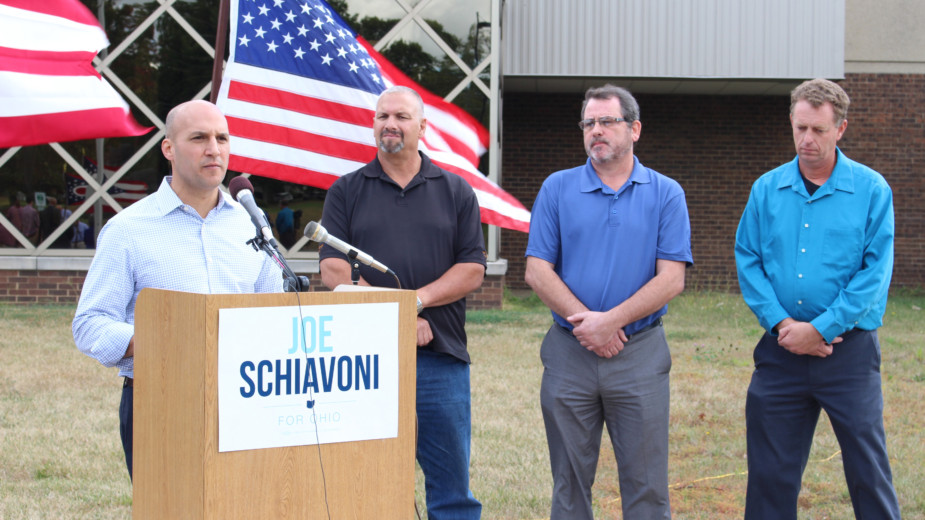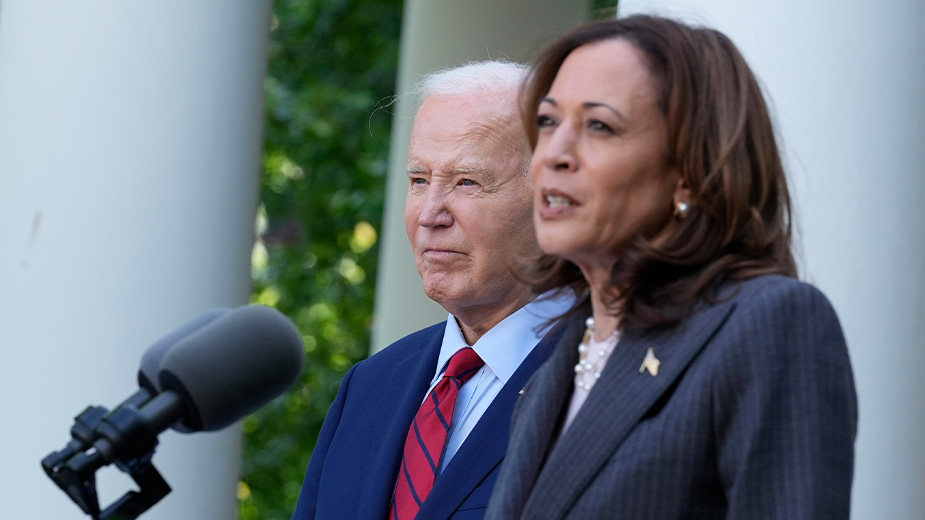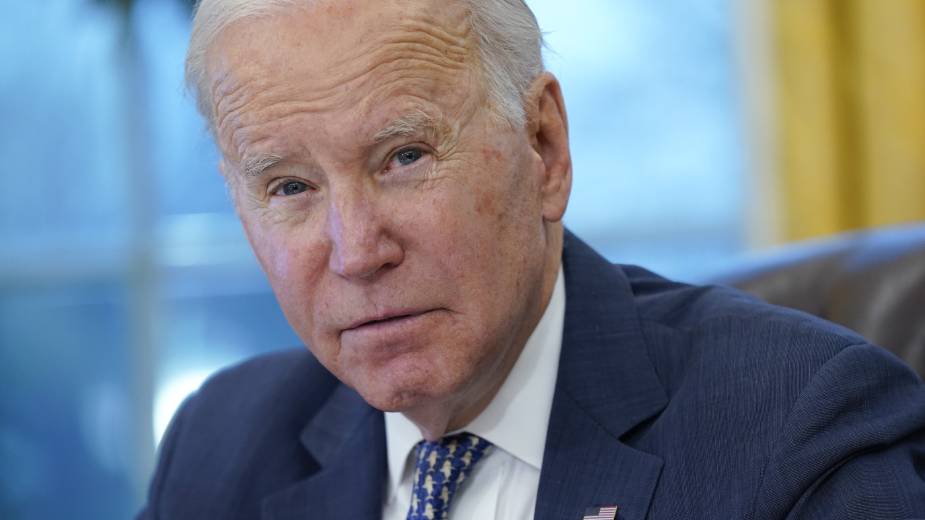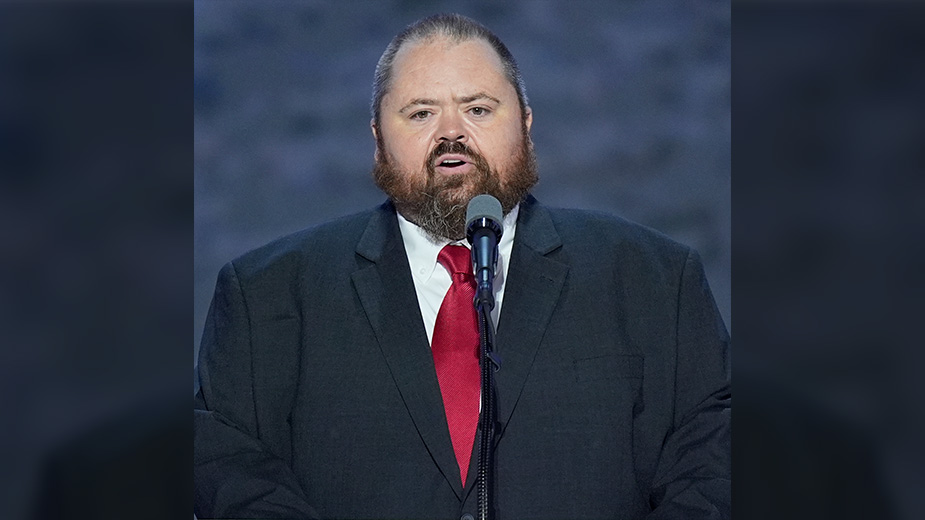Schiavoni Outlines Business, Jobs Plans
CANFIELD, Ohio – State Sen. Joe Schiavoni wants to close a tax loophole that he says would generate $2.5 billion to fund components of a jobs plan he introduced Thursday.
Schiavoni, who is seeking the Democratic nomination for governor, revealed his plan at a news conference in front of Mahoning County Career & Technical Center and at JoeForJobs.com. Representatives of organized labor, small businesses, education and community development joined him at the press event.
The plan Schiavoni, D-33 Boardman, outlined includes establishing a small business revolving microloan fund to help companies with fewer than 500 employees to meet capital needs, expand operations, and create and retain jobs. It would also boost funding for career tech education and business development, incentivize partnerships between business and higher education; upgrade the state’s infrastructure; clean brownfields and blight; and encourage green technology and other emerging industries.
“We’re talking about reinvesting. We’re talking about reinvigorating the economy. We’re talking about retraining workers,” he said. “We’re talking about rebuilding bridges and roads and underground infrastructure, and doing things that will benefit everyone.”
Schiavoni has introduced some of his proposals in the Ohio Senate and plans to introduce others over the next year. He would pay for his proposals by eliminating the business income tax break. Introduced in 2013, it allows companies to pay their partners in profit rather than as salary, allowing them to avoid taxes on the first $250,000 of income and pay 3% on any amount above that, he said.
The approach of the administration of Gov. John Kasich and the Republican-led General Assembly over the past several years has been to reduce income taxes, primarily for the highest earners, “mostly with the hope that they will create jobs,” Schiavoni said.
“Now we have been lagging in job growth for 55 months” and not adding jobs as quickly as other states “because that tax-cutting policy isn’t working,” he continued.
Representatives of the various organizations at the press event endorsed Schiavoni’s plan.
“What we’re talking about is being able to put people back to work,” said Marty Loney, organizer for Local 396 of the United Association of Plumbers, Fitters, Welders and HVAC Service Techs.
“Our infrastructure is crumbling. We have pipe in the ground since the early ’30s that needs replaced,” remarked Rocky DiGennaro, president of the Western Reserve Building & Construction Trades Council. “It’s not a Democrat or a Republican issue.”
Brian Collier, field representative for Local 8 of the Bricklayers and Allied Craftworkers, recalled visiting a project in Youngstown where contractors were working on a gas line that was installed in the late 1800s. “It just amazes me that we have infrastructure like that in this country that’s coming apart,” he said. “We really need to do something about it.”
Two elements of Schiavoni’s plan caught the eye of Debbie Woodford, president of 4’s Company, a metal fabrication ship in Austintown: the microloan program for small businesses and the incentives for partnerships between businesses and higher education.
“Sometimes small businesses don’t have the deep financial reserves that the larger corporations do to keep things afloat until payday actually comes for a job that you’ve just done for your customer,” Woodford said.
The lack of qualified workers also challenges business and the education incentives would help provide “a pipeline of skilled workers,” she added.
Schools that train workers appreciate the support Schiavoni is proposing in his plan, said Ron Iarussi, superintendent of MCCTC and Mahoning County Educational Service Center. The career center spends $180,000 annually to provide the tools and equipment students need to acquire industry credentials. Having to allocate school resources limits what courses the center can provide, he said.
The other part of the plan that intrigued Iarussi is a provision that would eliminate the requirement that students pay shop fees and other expenses for their courses – which totals a combined $60,000 per year at the technical school. More than half of the school’s students qualify for free or reduced lunches, he pointed out.
“All of these costs that would be alleviated would allow us to provide a better opportunity for programming for our students,” Iarussisaid.
Ian Beniston, executive director of Youngstown Neighborhood Development Corp., characterized the proposal as not just a jobs plan but a plan to “strengthen and revitalize” communities across the state.
Schiavoni is proposing “very concrete things” such as improving infrastructure, fighting blight and providing more money for demolition as well as employing people and making them ready for employment, providing access to capital for small businesses and increasing opportunity for minority-owned enterprises, Beniston said.
“When you think about it, all of these things are things that are critical to creating healthy neighborhoods, healthy communities and a healthy state,” he said.
Copyright 2024 The Business Journal, Youngstown, Ohio.



